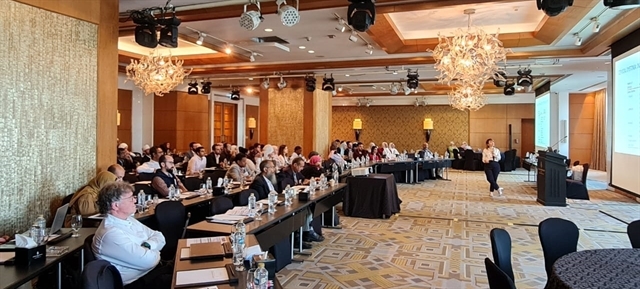 VOLUME 28, ISSUE 1 • March, 2024. Full issue »
VOLUME 28, ISSUE 1 • March, 2024. Full issue »

Although botulinum toxin is already available in several African nations, neurologists in those nations do not have access to training regarding its use. Despite the fact that deep brain stimulation (DBS) is available in a few African countries, more patients consult for advanced therapies and then seek these therapies in other countries. This is why providing the basic knowledge and skills related to the use of these therapies to Africans is essential.

The “Movement Disorders Acquiring Clinical Skills Course: Botulinum Toxin, Pump Therapies, and Deep Brain Stimulation” was dedicated towards this mission. The two-day course, which was at the Four Seasons Hotel Nile Plaza in Cairo, Egypt, on November 16-17, 2023, comprised talks from well-known African and international professionals.

The first day of the course included lectures on the management of Parkinson’s disease and hyperkinetic movement disorders, followed by lectures discussing different advanced therapies and proper patient selection. At the end of the day, the participants were distributed into separate interactive groups moderated by eminent African and international experts, which included instruction on: DBS selection and programming; apomorphine pump selection; patient selection; and the use of the levodopa challenge test.
The second day focused on the use of botulinum toxin in movement disorders, including spasticity. This was followed by another interactive round for anatomical and ultrasound localization of the muscles of the head, upper, and lower limbs. The last session included the hands-on injection of several variable patients with movement disorders using EMG and ultrasound.
86 neurologists and health professionals from 10 African countries attended this exceptional course. The feedback from participants and faculty was excellent. One essential factor of the success of this course was having world-renowned faculty, including Professors Francesca Morgante, Joerg Wessel, and Jens Volkmann, in addition to our expert African colleagues. Also, MDS and the MDS Secretariat provided the tools to support the success of this extraordinary, first-of-its-kind course.

Participants shared that they enjoyed the lectures, discussions, interactive clinical rounds, hands-on sessions, and charming winter weather in Cairo. Since its recent creation, the MDS-African Section has continued to demonstrate its remarkable role in providing knowledge and training for African physicians and allied health professionals through these outstanding education activities.
Read more Moving Along:






